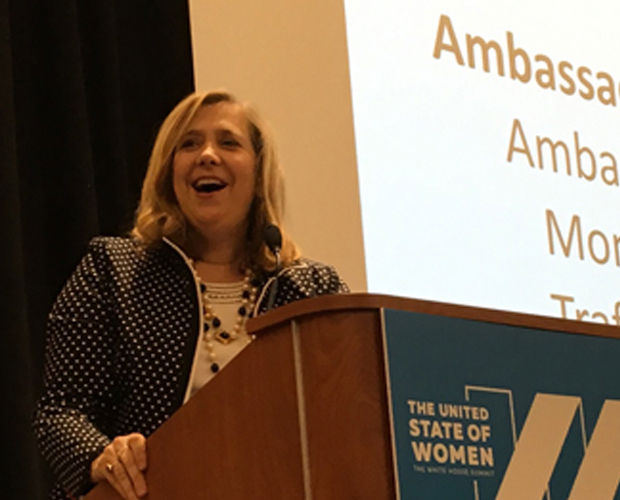Sanford Alumna Combats Human Trafficking Around the World

by Adam Beyer
Combating human trafficking around the world was not what Susan Coppedge PPS’88 expected to be doing after leaving Duke. Initially, she wanted to practice environmental law. But an experience while she was an assistant U.S. attorney put the Stanford law grad on the path that eventually would lead to her current job: Ambassador-at-Large to Monitor and Combat Trafficking in Persons and Senior Advisor to the Secretary of State.
A fellow U.S. attorney in Atlanta was bringing one of the first prosecutions against sex traffickers and needed a partner for the trial. Coppedge volunteered. Together, they won the case, helping to provide justice for approximately 36 girls between the ages of 14 and 17. When the other attorney went on to become a judge, Coppedge became the office’s most experienced attorney at handling trafficking cases and continued pressing for justice in the courtroom.
“This was an area I felt really called to because of the opportunity to speak on behalf of people who thought no one would ever listen to or believe their stories,” Coppedge said.
Working with the FBI, the Department of Homeland Security, and NGOs, she prosecuted more than 45 human traffickers and assisted approximately 90 victims.
She was appointed by President Obama to serve in her current role in October 2015. It’s a big job.
The scale of trafficking as a problem within the United States is hard to quantify, but worldwide estimates suggest that 21 million people are victimized by some form of labor or sex trafficking.
With a staff of about 50 people, Coppedge is responsible for leading the United States’ global engagement against human trafficking, an umbrella term used to describe the activities involved when someone obtains or holds a person in compelled service. This requires working with a plethora of federal agencies, foreign governments and NGOs to push policy changes around the world.
The Sanford School has research that intersects with her line of work. Judith Kelley, Kevin D. Gorter Professor of Public Policy, has written a book about the ways the State Department’s annual assessment of countries’ efforts to end trafficking, known as the Trafficking in Persons Report, influences the countries’ behavior. Coppedge said she looks forward to reading it when it is published.
Ensuring survivors of trafficking have a voice in the criminal justice system is important, she said. On one occasion, she recalls witnessing a victim address her traffickers in court during sentencing. The woman spoke about how she would return to the trafficker’s home each night and cry, worried that only the walls would listen to her. The criminal case allowed her to finally tell her story.
“I have told U.S. Senators, states’ Attorneys General and foreign government leaders her story so everyone can hear her cry,” she said.
The way the United States handles trafficking has changed drastically over the course of Coppedge’s career. There was no federal anti-trafficking law on the books until 2000, when Congress passed the Trafficking Victims Protection Act. This, along with the UN Palermo Protocol to Prevent, Suppress and Punish Trafficking in Persons, especially Women and Children, helped shift policies toward treating those affected by trafficking as victims rather than as criminals.
Her current role at the State Department places more emphasis on policy than on her courtroom skills, and requires her to draw on her educational background at Duke.
“I really liked the hands-on and practical aspects of public policy — the fact that you could learn to become a better public servant,” she said, adding that former professor Bruce Payne’s ethics and leadership course was an influential part of her college experience.
Duke basketball has become a topic that even the most senior government officials bring up, she said. Her job interview with Secretary of State John Kerry came a couple days after the men’s basketball team won the 2015 national championship. She saw it as a good omen.
“The Secretary actually asked if I had watched the game and then he and I talked basketball,” she said about the interview.
In late September, Coppedge will visit Sanford for a panel discussion on human trafficking with two other Duke alums. Amy Pope JD’01, Deputy Assistant to the President and Deputy Homeland Security Advisor on the National Security Council staff, and Andrea Wilson MPP/MBA’12, Foreign Affairs Officer in the TIP Office, will join Coppedge in a discussion moderated by Professor Kelley.
“I always get energized hearing from younger people,” Coppedge said. “A lot of ideas in the anti-trafficking world are coming from colleges and universities. I’m thrilled to be getting back to Durham.”

